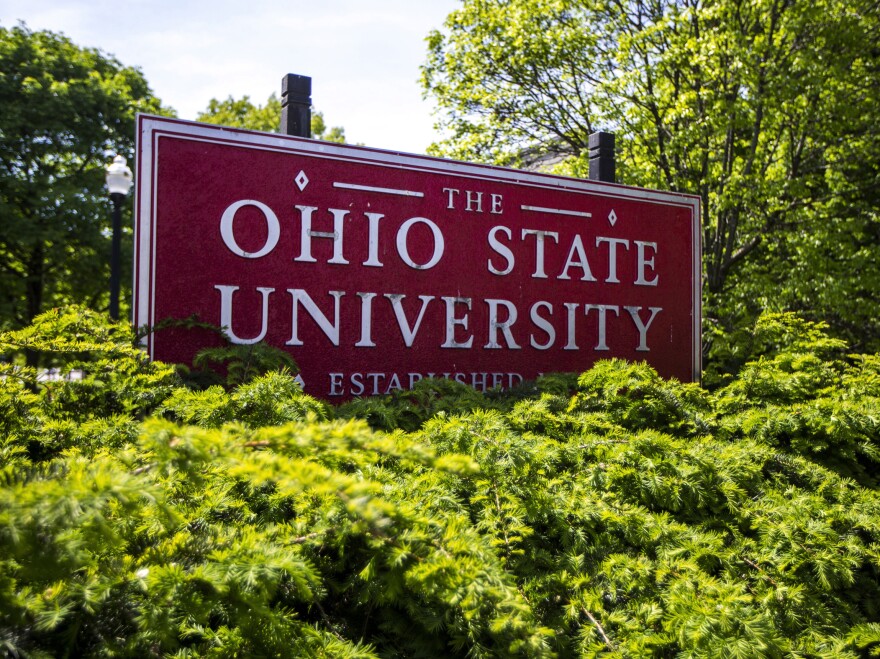Occasionally, when attending a cultural event or visiting a webpage, you may be greeted with a statement saying that the event or institution is on land that originally belonged to Indigenous people.
These are land acknowledgements, and they're no longer allowed at Ohio State University under most circumstances.
Ohio State's new policy says that land acknowledgements are considered statements "on behalf of an issue or cause" and that they cannot be given by a university department or at university-sponsored events. Land acknowledgements also cannot be placed on "any university channel or resource such as websites, social media, signage, meeting or event agendas, (or) event programs."
The policy goes on to restrict the use of land acknowledgements in the classroom: "Land acknowledgements should not be used in written class materials or stated verbally unless there is a direct tie to the subject of the course. Ohio State respects the history of the state and university and will continue to engage in research, academic scholarship, conversations and opportunities to honor this history, but will not issue statements taking a position on, endorsing, opposing or engaging in advocacy or calls to action around this."
The policy is part of OSU's compliance with Senate Bill 1, a sweeping state higher education law that bans diversity, equity and inclusion initiatives and prohibits faculty from striking. The law does not directly mention land acknowledgements.
University spokesman Ben Johnson said the policy does not "categorically prohibit" land acknowledgements. It leaves room for faculty to discuss land acknowledgements if that's part of the class material.
"Faculty retain their academic freedom and may address acknowledgements where relevant to the subject matter of the class," Johnson said.
Johnson did not say if there would be repercussions for faculty or departments that use land acknowledgments in a way that is inconsistent with OSU's policy.
Elissa Washuta, director of OSU's American Indian Studies Program, called the implications of the policy "chilling." She said she was speaking as an individual faculty member and not on behalf of the university. Washuta is also a Cowlitz tribal member.
"The guidance conflates all forms of land acknowledgments, including strictly factual historical statements, into prohibited statements on behalf of a cause," Washuta said. "The treatment of tribal histories, and the history of tribal lands that are part of OSU’s legacy as a land-grant institution, as controversial — that’s alarming and is not consistent with my reading of SB1."
Ohio State was established in 1870 as a land-grant institution. The Morrill Act of 1862 distributed public domain land to states to create institutes of higher education to teach agriculture and mechanics. Projects like HighCountryNews' Land-Grab Universities connect the endowment of land-grant institutions with the removal of American Indians from their land.
Ohio State University never had an official land acknowledgement statement, but some organizations or departments within the university shared statements.
OSU's Clinical and Translational Science Institute, wrote on its website, "we would like to acknowledge the land that The Ohio State University occupies is the ancestral and contemporary territory of the Shawnee, Potawatomi, Delaware, Miami, Peoria, Seneca, Wyandotte, Ojibwe and Cherokee peoples. Specifically, the university resides on land ceded in the 1795 Treaty of Greeneville and the forced removal of tribes through the Indian Removal Act of 1830. As a land grant institution, we want to honor the resiliency of these tribal nations and recognize the historical contexts that has and continues to affect the Indigenous peoples of this land."
An explanation of land acknowledgements remains on Ohio State University's Newark Earthworks Center, which develops research about Midwestern American Indian cultures. That webpage now includes an overview of the university's policy and adds, "This page is online as part of an archive of past grant work and does not reflect The Ohio State University's position and views at this time."
Land acknowledgements have long elicited mixed reactions from Indigenous leaders and activists. The statements are sometimes seen as well-meaning but empty, or purely performative. Others believe land acknowledgements are important because they bring attention to often untaught or inaccurately told colonial histories of the United States and Canada.
"A land acknowledgment isn’t necessarily a call to action—that’s why there’s so much online commentary on land acknowledgements that take people to task for not detailing the speaker’s responsibilities," Washuta said. "Many people believe a land acknowledgment should take a stance, but in truth, it doesn’t have to."
Washuta said she's also concerned that OSU's policy doesn't clarify when teachers can include land acknowledgements in their classrooms.
"The work I do — the work many of us do — draws unexpected connections between seemingly disparate topics. Who decides whether there’s a direct tie? It seems that faculty and department leaders have a lot of say here, but there’s a lot of uncertainty right now," she said.



